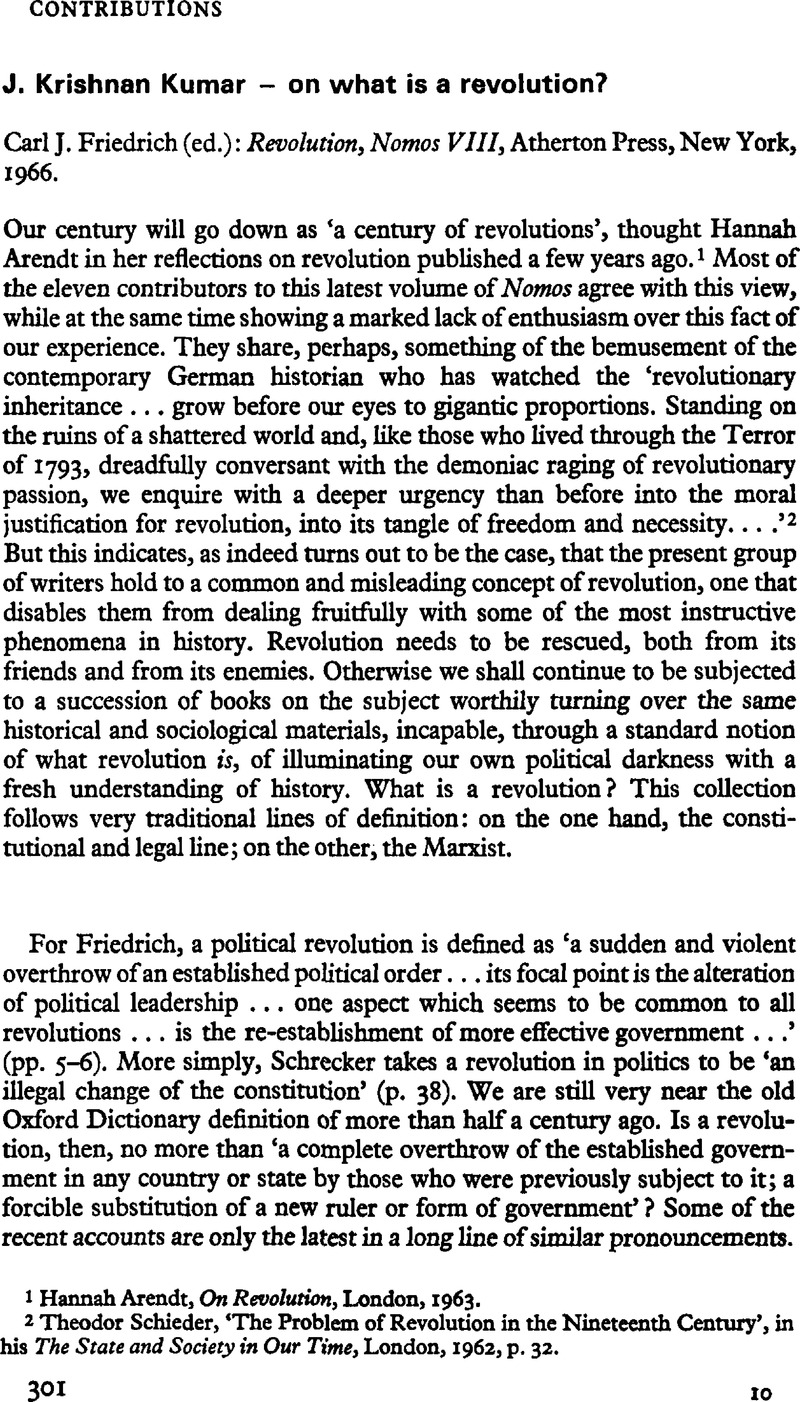No CrossRef data available.
Article contents
what is a revolution?
Review products
Published online by Cambridge University Press: 28 March 2014
Abstract

Information
- Type
- Contributions
- Information
- Copyright
- Copyright © Government and Opposition Ltd 1967
References
1 Hannah Arendt, On Revolution, London, 1963.
2 Theodor Schieder, ‘The Problem of Revolution in the Nineteenth Century’, in his The State and Society in Our Time, London, 1962, p. 32.
3 L.P. Edwards, The Natural History of Revolution, Chicago, 1927, p. 2.
4 Crane Brinton, The Anatomy of Revolution (rev. ed.), New York, 1952, p. 4.
5 Arthur Hatto, ‘Revolution: An Inquiry into the Usefulness of an Historical Term’, Mind, Vol. LVIII, 1949.
6 Wilber, D. and Zollschan, G.K. ‘Prolegomena to a Theory of Revolutions’, in (eds.) Zollschan and Hirsch, Explorations in Social Change, London, 1964.Google Scholar
7 As, for instance, indicated in Sir Ronald Syme's, The Roman Revolution, Oxford, 1939
8 H. Arendt, op. cit., p. 27.
9 Hatto, op. cit.; Arendt, op. cit., p. 21.
10 See Latham, R. C. ‘English Revolutionary Thought, 1640‐1660’, History, Vol. roc, 03, 1945, pp. 38–59.Google Scholar
11 Discorsi, I, 2.
12 Republic, IV, 1.
13 Arendt, op. cit., p. 35.
14 For instance, Ellwood, C. A. ‘As Bodin long ago pointed out, the mark of revolution [in politics] is a change in the location of sovereignty.’ Quoted in Dale Yoder, ‘Current Definitions of Revolution’, American journal of Sociology, Vol. XXXII, 1926–7, PP. 433–41.Google Scholar
15 Borkenau, F. ‘State and Revolution in the Paris Commune, the Russian Revolution, and the Spanish Civil War’, Sociological Review, 01 1937, PP. 41–75.CrossRefGoogle Scholar
16 See, for instance, Alfred Meusel, ‘Revolution and Counter‐Revolution’, in The Encyclopaedia of the Social Sciences. And cf. Maclver:'… Sometimes the forces of the ancien régime recover enough strength to overthrow by violence the new order. This is the counter‐revolution.' The Web of Government (rev. ed.), New York, 1965, p. 208.
17 Quoted in Bury, J. B. The Idea of Progress, London, 1923, p. 203.Google Scholar
18 Arendt, op. cit., pp. 242ff. For an analysis of the 1848 revolution in France which regards revolution as basically the dissolution of the state's monopoly of power, and not as its more effective reconstitution, see Peter Amann, ‘Revolution: A Redefinition’, Political Science Quarterly, Vol. LXXVII, March 1962, pp. 36–53.
19 Though never explicitly, or completely: e.g. MacPherson: ‘I take revolution to mean a transfer of state power… and the subsequent consolidation of that transferred power, with a view to bringing about a fundamental change in social, economic, and political institutions’ (p. 140). For other accounts which revolve around a similar notion of revolution, see Meusel, op. cit.; Louis Gottschalk, ‘Causes of Revolution’, AJS, July 1944; Sigmund Neumann, ‘The International Civil War’, World Politics, Vol. 1, April 1949, pp. 333–50; Chalmers Johnson, Revolution and the Social System, Hoover Institution Studies 3, Stanford University, 1964.
20 Marx, The Critique of Hegel's Philosophy of Right.
21 ‘Only in an order of things where there are no classes and no class conflicts will the social evolutions cease to be political revolutions.’ Marx, The Poverty of Philosophy.
22 Ralf Dahrendorf, Class and Class Conflict in Industrial Society, London, 1959, p. 131.
23 Marx, The Civil War in France. See also the Preface to the 1872 German edition of the Communist Manifesto.
24 Engels, Introduction (1891), to Marx's The Civil War in France.
25 Lenin, The State and Revolution (September, 1917); Can the Bolsheviks Retain State Power? (October, 1917); The Proletarian Revolution and the Renegade Kautsky (November 1918).
26 Quoted in Schapiro, L. The Communist Party of the Soviet Union, London, 1963, p. 205.Google Scholar
27 Borkenau, F. art. cit., p. 58.Google Scholar
28 Thucydides, The Peloponnesian War, Bk. III, Ch. 5 (trans. Warner).
29 E.g., in the Nomos volume, Pettee, p. II.
30 Aristotle in Bk. V of the Politics uses both stasis and metabole politeion.
31 Liddell and Scott give as other meanings of stasis, ‘standing still’, ‘stationariness’.
32 Collingwood, R. G. The New Leviathan, p. 199.Google Scholar

